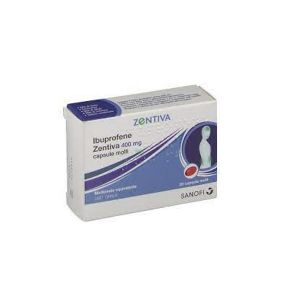Ship in Europe, Find out rates!
Zentiva Ibuprofen 400 mg Anti-inflammatory 20 Softgels

- box Delivery in Italy in 24/48 and free returns
- star3.000+ positive reviews
- dropboxOver 60,000 products in the catalog
Therapeutic indications
IBUPROFENE ZENTIVA is indicated for the symptomatic treatment of headaches, migraines, dental pain, back pain, dysmenorrhea, muscle pain, neuralgia, non-serious arthritic conditions, rheumatic pain, colds accompanied by fever and flu. IBUPROFENE ZENTIVA 400 mg is recommended for adults and adolescents over 12 years of age (body weight 40 kg or more). Given the amount of active ingredient contained in a capsule, IBUPROFENE ZENTIVA 200 mg is recommended for adults and children over 6 years of age (body weight equal to or greater than 20 kg).
Dosage
Posology For oral administration and short-term use only. Adults and adolescents over 12 years of age (body weight 40 kg or more) : The lowest effective dose should be used for the minimum time necessary to relieve symptoms. Adults should seek medical attention if symptoms persist or worsen, or if the product is needed for more than 10 days. Consult your doctor if adolescents (over 12 years of age) need the medicine for more than 3 days or if symptoms worsen. The recommended dose ranges from 200 mg to 400 mg of ibuprofen, up to three times a day as needed. The interval between two doses must be at least 4 hours. Do not exceed the dose of 1200 mg in 24 hours. Children over 6 years of age (body weight ≤ 39 kg) For children aged 6 to 12 years, the product containing 200 mg of ibuprofen is recommended. IBUPROFENE ZENTIVA 200 mg should only be used in children weighing at least 20 kg. The maximum total daily dose of ibuprofen is 20–30 mg per kg of body weight, divided into 3–4 single doses, at dose intervals of 6–8 hours. Do not exceed the maximum recommended daily dose. Do not exceed the total dose of 30 mg / kg of ibuprofen in 24 hours. In children, the following administration instructions apply to IBUPROFENE ZENTIVA 200 mg:
| Body weight | Single dose in number of capsules | Maximum daily dose in number of capsules |
| Children from 20 to 29 kg | 1 capsule of IBUPROFENE ZENTIVA 200 mg (ibuprofen 200 mg) | 3 (equivalent to 600 mg of ibuprofen) |
| Children from 30 to 39 kg | 1 capsule of IBUPROFENE ZENTIVA 200 mg (ibuprofen 200 mg) | 4 (equivalent to 800 mg of ibuprofen) |
Overdose
In children, ingestion of more than 400 mg / kg can cause symptoms. In adults, the dose-response effect is less clear. The half-life in overdose is 1.5–3 hours. Symptoms Most patients who have ingested clinically significant amounts of NSAIDs develop only nausea, vomiting, epigastric pain or, more rarely, diarrhea. Tinnitus, headache, and gastrointestinal bleeding are also possible. With more severe poisoning, central nervous system toxicity is observed manifesting as drowsiness and occasionally as excitement and disorientation or coma. Sometimes patients develop seizures. Metabolic acidosis may occur in severe poisoning and the prothrombin time / INR may be prolonged, possibly due to interference with the activity of circulating clotting factors. Acute renal failure and liver damage can occur. In asthmatics, exacerbation of asthma is possible. Management Management should be symptomatic and supportive and should include maintaining a patent airway and monitoring cardiac and vital parameters until stabilization. Consider administering activated charcoal if the patient presents within 1 hour of ingesting a potentially toxic amount. If frequent or prolonged, seizures should be treated with intravenous diazepam or lorazepam. In case of asthma, administer bronchodilators.
Contraindications
- Hypersensitivity to the active substance or to any of the excipients listed in section 6.1; - Patients with a history of hypersensitivity reactions (e.g. bronchospasm, asthma, rhinitis, angioedema or urticaria) associated with the intake of acetylsalicylic acid (ASA) or other non-steroidal anti-inflammatory drugs (NSAIDs); - Presence or history of recurrent peptic ulcer / bleeding (two or more distinct episodes of proven ulceration or bleeding); - History of gastrointestinal bleeding or perforation related to previous NSAID therapy; - Disorders of blood coagulation and hematopoiesis; - Patients with severe hepatic insufficiency, severe renal insufficiency or severe heart failure. See also section 4.4; - During the last trimester of pregnancy there is a risk of premature closure of the fetal arterial duct, with possible persistent pulmonary hypertension. Labor may be delayed and last longer, with a greater tendency to bleeding for both mother and baby (see section 4.6). IBUPROFENE ZENTIVA 200 mg is not suitable for children under 6 years of age (body weight <20 kg), due to the amount of active ingredient contained in one capsule. IBUPROFENE ZENTIVA 400 mg is not suitable for children under 12 years of age (body weight <40 kg), due to the amount of active ingredient contained in one capsule.
Side effects
Hypersensitivity reactions have been reported, which may consist of a) non-specific allergic reactions and anaphylaxis b) reactivity of the respiratory tract, for example, asthma, aggravated asthma, bronchospasm, dyspnoea c) various skin reactions, for example itching, urticaria, angioedema and, more rarely, exfoliative and bullous dermatitis (including epidermal necrolysis and erythema multiforme) The following list of adverse effects relative to those observed with ibuprofen at over-the-counter doses for short-term use. Additional adverse effects may occur in the treatment of chronic conditions or in long-term treatment.
| MedDRA system organ classification | Frequency | Undesirable effect |
| Disorders of the blood and lymphatic system | Very rare | Haematopoietic disorders (anemia, leukopenia, thrombocytopenia, pancytopenia, agranulocytosis). The first signs are: fever, sore throat, superficial mouth ulcers, flu-like symptoms, severe exhaustion, bleeding and bruising of unknown origin. |
| Disorders of the immune system | Very rare | In patients with pre-existing autoimmune disorders (such as systemic lupus erythematosus, mixed connective tissue disease) isolated cases of aseptic meningitis symptoms such as neck stiffness, headache, nausea, vomiting, fever or disorientation have been observed during treatment with ibuprofen (see section 4.4). . |
| Nervous system disorders | Uncommon | Headache |
| Very rare | Aseptic meningitis, isolated cases have been reported | |
| Ear and labyrinth disorders | Not known | Impaired hearing |
| Gastrointestinal disorders | Uncommon | Abdominal pain, dyspepsia and nausea |
| Rare | Diarrhea, flatulence, constipation and vomiting | |
| Very rare | Peptic ulcer, gastrointestinal perforation or haemorrhage, melaena, haematemesis, sometimes fatal, particularly in the elderly. (See section 4.4) Ulcerative stomatitis, gastritis. Exacerbation of ulcerative colitis and Crohn's disease (see section 4.4) | |
| Hepatobiliary disorders | Very rare | Liver problems |
| Skin and subcutaneous tissue disorders | Uncommon | Various skin rashes |
| Very rare | Forms of severe skin reactions such as bullous reactions may occur, including Stevens-Johnson syndrome, erythema multiforme and epidermal necrolysis Toxic | |
| Renal and urinary disorders | Very rare | Acute renal failure, papillary necrosis, especially with long-term use, associated with increased serum urea and edema |
| Hypersensitivity reactions | Uncommon | Hypersensitivity reactions with hives and itching |
| Very rare | Severe hypersensitivity reactions. Symptoms may include swelling of the face, tongue and larynx, dyspnoea, tachycardia, hypotension (anaphylaxis, angioedema or severe shock). Exacerbation of asthma and bronchospasm. |
Pregnancy and breastfeeding
Pregnancy Inhibition of prostaglandin synthesis can have negative effects on pregnancy and / or embryo-fetal development. Data from epidemiological studies suggest an increased risk of miscarriage and cardiac malformation and gastroschisis after use of a prostaglandin synthesis inhibitor in early pregnancy. The absolute risk of cardiac malformations increased from less than 1% to approximately 1.5%. The risk was considered to increase with dose and duration of therapy. In animals, administration of prostaglandin synthesis inhibitors has been shown to cause an increase in pre- and post-implantation loss and embryo-fetal mortality. In addition, an increased incidence of various malformations, including cardiovascular, has been reported in animals administered prostaglandin synthesis inhibitors during the organogenetic period. Ibuprofen should not be administered during the first and second trimester of pregnancy unless clearly necessary. If ibuprofen is used by women who are trying to conceive, or during the first or second trimester of pregnancy, the dose should be kept as low as possible and the duration of treatment should be as short as possible. In the third trimester of pregnancy, all prostaglandin synthesis inhibitors can expose the fetus to: - cardiopulmonary toxicity (with premature closure of the arterial duct and pulmonary hypertension); - renal dysfunction, which can progress to renal failure with oligohydroamnios; the mother and the newborn, at the end of pregnancy, to: - a possible prolongation of the bleeding time, an antiplatelet effect which could occur even at very low doses; - an inhibition of uterine contractions, with consequent delay or prolongation of labor. Consequently, ibuprofen is contraindicated during the third trimester of pregnancy (see section 4.3). Breastfeeding In limited studies, ibuprofen has been found in breast milk at very low concentrations and is unlikely to have adverse effects on the nursing infant. Fertility There is some evidence that drugs that inhibit cyclooxygenase / prostaglandin synthesis may impair female fertility through an effect on ovulation. This effect is reversible after discontinuation of treatment (see section 4.4).
Special warnings
Undesirable effects can be limited by using the lowest effective dose for the minimum duration necessary to control symptoms (see gastrointestinal (GI) and cardiovascular risk below). Pediatric population There is a risk of renal damage in dehydrated children and adolescents. Elderly The elderly have an increased frequency of adverse reactions to NSAIDs, particularly gastrointestinal bleeding and perforation, which can be fatal (see section 4.8). Respiratory Effects Bronchospasm may worsen in patients with bronchial asthma or allergic disease or with a history of these disorders. Caution should be exercised in patients suffering from allergic rhinitis, nasal polyps or chronic obstructive respiratory disorders, as there is an increased risk of allergic reactions in these patients. Other NSAIDs The concomitant use of ibuprofen and other NSAIDs, including selective cyclooxygenase-2 inhibitors, should be avoided (see section 4.5). Systemic lupus erythematosus and mixed connective tissue Systemic lupus erythematosus and mixed connective tissue disease increasing the risk of aseptic meningitis (see section 4.8). Renal effects There is a risk of renal damage as renal function may further deteriorate (see sections 4.3 and 4.8). Monitoring of renal function is recommended in patients at risk, e.g. patients with heart and renal insufficiency, patients treated with diuretics or in case of dehydration of any etiology. In general, the habitual intake of analgesics, in particular the combination of various active ingredients to relieve pain, can lead to permanent kidney damage, with the risk of kidney failure (analgesic nephropathy). The risk may increase in the case of physical stress associated with salt loss and dehydration. Therefore, it must be avoided. Hepatic effects Hepatic dysfunction (see sections 4.3 and 4.8). In case of prolonged administration, control of blood counts and regular monitoring of renal and hepatic function are advisable. Treatment with ibuprofen should be discontinued in the event of deterioration of liver function related to its administration. The state of health usually returns to normal after stopping treatment. Occasional blood glucose monitoring is also appropriate. Cardiovascular and cerebrovascular effects Caution (also discuss with your doctor or pharmacist) is required before starting treatment in patients with a history of hypertension and / or heart failure, as fluid retention, hypertension have been reported in association with NSAID therapy. and edema. Data from clinical and epidemiological studies suggest that the use of ibuprofen, particularly at high doses (2400 mg per day) and in the case of long-term treatment, may be associated with a slightly increased risk of arterial thrombotic events (e.g. myocardial infarction or stroke). In general, epidemiological studies do not suggest that low doses of ibuprofen (e.g. ≤ 1200 mg per day) are associated with an increased risk of myocardial infarction. Patients with uncontrolled hypertension, congestive heart failure, established ischemic heart disease, peripheral arterial disease and / or cerebrovascular disease should only be treated with ibuprofen after careful consideration. Similar considerations should be made before initiating long-term treatment in patients with risk factors for cardiovascular disease (eg hypertension, hyperlipidemia, diabetes mellitus, smoking). Impairment of female fertility There is evidence that drugs that inhibit cyclo oxygenase / prostaglandin synthesis may impair female fertility by an effect on ovulation. This effect is reversible after discontinuation of treatment. In women who have difficulty conceiving or who are undergoing a fertility assessment, discontinuation of ibuprofen therapy should be considered. Gastrointestinal effects NSAIDs should be administered with caution to patients with a history of gastrointestinal disease (ulcerative colitis, Crohn's disease), as these disorders may be exacerbated (see section 4.8). Life-threatening gastrointestinal (GI) bleeding, ulceration or perforation have been reported with all NSAIDs at any time during treatment, with or without warning symptoms or a previous history of GI events. With increasing NSAID doses, the risk of gastrointestinal (GI) bleeding, ulceration or perforation is increased in patients with a history of ulcer, particularly if complicated with haemorrhage or perforation (see section 4.3), and in the elderly. These patients should start treatment at the lowest available dose. For these patients, as well as for patients requiring concomitant use of low doses of acetylsalicylic acid or other active substances that may increase gastrointestinal risk (see below and section 4.5), combination therapy with protective agents should be considered ( e.g. misoprostol or proton pump inhibitors). Patients with a history of gastrointestinal (GI) toxicity, particularly the elderly, should report any unusual abdominal symptoms (especially gastrointestinal (GI) bleeding), particularly during the initial stages of treatment. Caution is advised in patients receiving concomitant medications that may increase the risk of gastrointestinal (GI) ulceration or bleeding, such as oral corticosteroids, anticoagulants such as warfarin, selective serotonin reuptake inhibitors or antiplatelet agents such as acetylsalicylic acid ( see section 4.5). If gastrointestinal (GI) bleeding or ulceration occurs in patients taking ibuprofen, treatment should be stopped. Dermatological effects Serious skin reactions, some fatal, including exfoliative dermatitis, Stevens-Johnson syndrome and toxic epidermal necrolysis, have been reported very rarely in association with the use of NSAIDs (see section 4.8). Patients appear to be at a higher risk of developing these reactions at the start of therapy: in the majority of cases, the reactions occur within the first month of treatment. Ibuprofen therapy should be discontinued as soon as skin rashes, mucosal lesions or any other signs of hypersensitivity appear. Other Notes Prolonged use of any type of pain reliever for headache can worsen the disorder. If this occurs or is suspected, contact your doctor and discontinue treatment. A diagnosis of drug overuse headache should be suspected in patients with frequent or daily headaches despite (or as a result of) regular use of headache medications. As a consequence of concomitant alcohol consumption, the undesirable effects of the active substance, in particular those concerning the gastrointestinal tract or the central nervous system, could be increased during the use of NSAIDs. Ibuprofen can mask the symptoms of an infection (fever, pain, and swelling). Excipients IBUPROFENE ZENTIVA contains sorbitol. Patients with rare hereditary problems of fructose intolerance should not take the medicine. IBUPROFENE ZENTIVA 200 mg contains 16 mg of potassium per capsule. IBUPROFENE ZENTIVA 400 mg contains 32 mg of potassium per capsule.
Expiry and Retention
Store below 25 ° C. Store in the original package in order to protect from moisture.
Active principles
Each soft capsule contains 200 mg ibuprofen. Each soft capsule contains 400 mg ibuprofen. Excipient (s) with known effect: sorbitol (E420). For the full list of excipients, see section 6.1.
Excipients
Macrogol 600 Potassium hydroxide 85% (E525) Gelatin Purified water Liquid sorbitol, partially dehydrated (E420) Carmine red 43% (E120)

